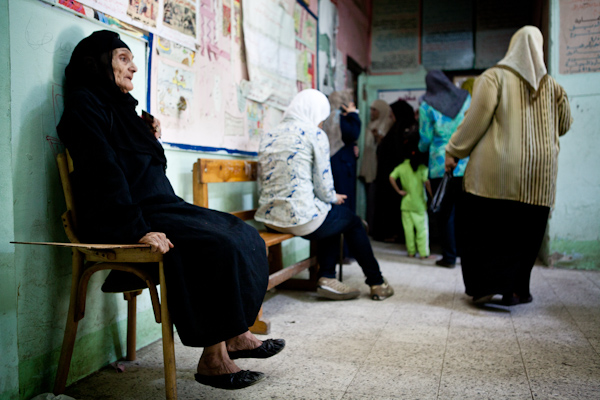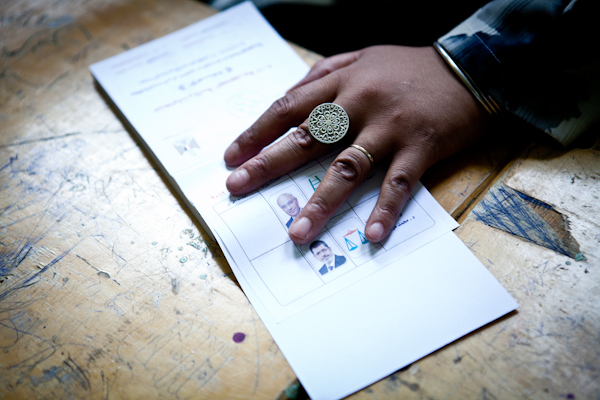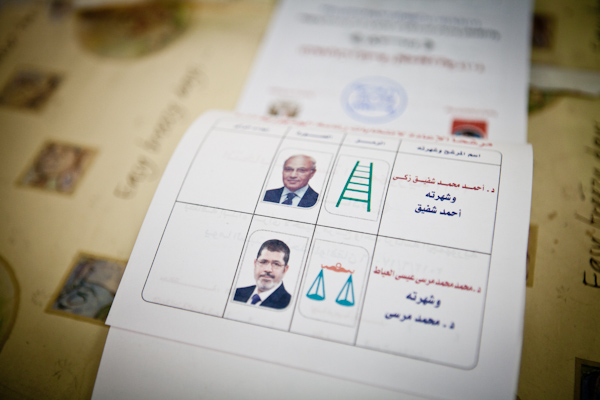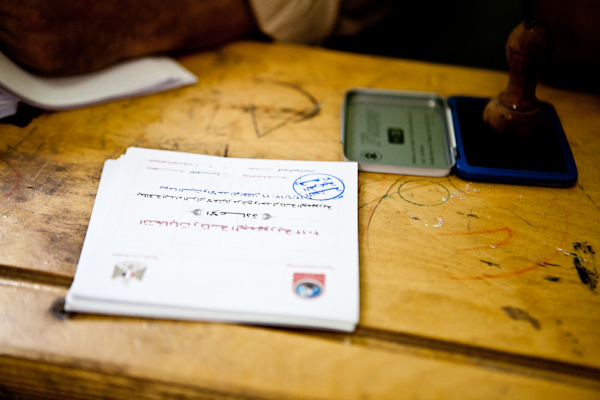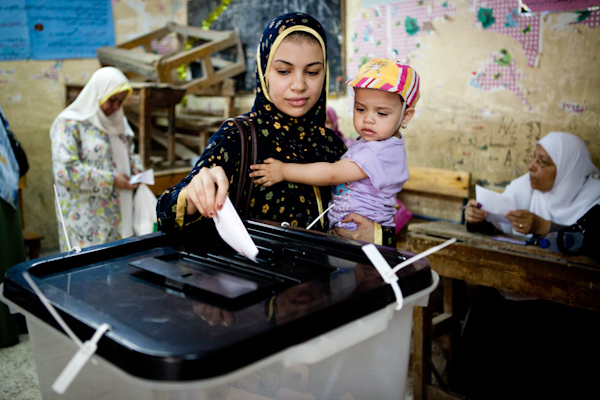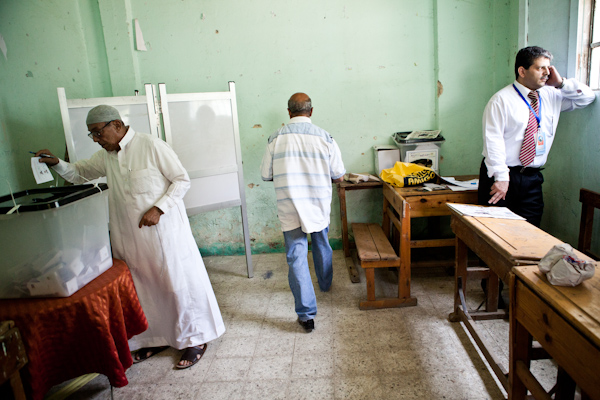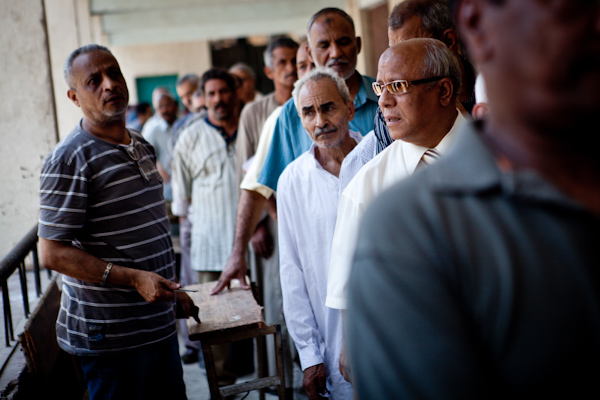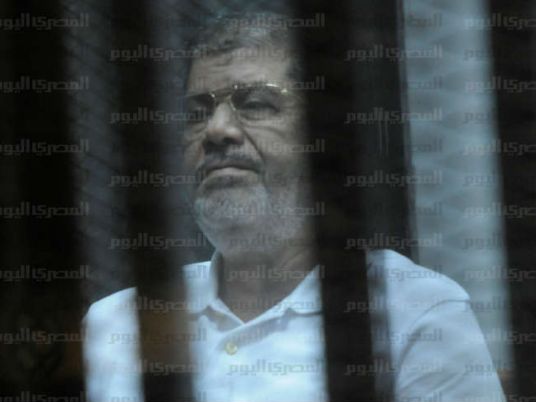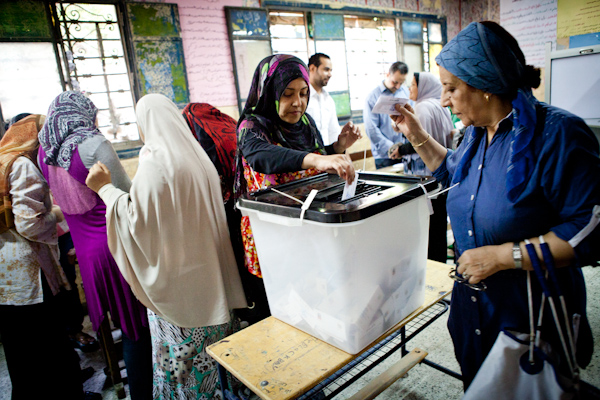
Polling stations are open for the first day of voting in the presidential election run-offs. The second round of the election pits the Muslim Brotherhood's Mohamed Morsy against former Prime Minister Ahmed Shafiq. The two candidates secured 5,764,952 and 5,505,327 votes respectively in the first round held in May. Forty-six percent of eligible voters cast their ballot in the first round of elections. The run-offs are taking place in some 13,101 polling stations nationwide. The elections are supervised by 14,509 judges, with the help of employees from the Ministry of Justice. Vote counting is expected to begin on Monday and the final results are expected to be announced on Thursday.
9:00 pm: Polling stations close, to be opened tomorrow morning at 8 am. Authorities said all ballot boxes will kept in the polling stations, which will be locked and guarded by security forces. In press conference, head of the Presidential Elections Commission Farouk Sultan said that official elections results should be announced within a week.
The Health Ministry raised the number of people injured in election-related scuffles and crowding over the course of the day to 28.
8:00 pm: Minister of the Interior Mohammed Ibrahim warned of a "conspiracy" that some groups have plotted to disrupt the first day of the runoff in the presidential elections. The minister said he had heard confirmed reports of conspirators wearing police uniforms and committing acts of violence outside of voting stations.
He said the ministry had also received information about a shipment of invisible pens into the country. To prevent their use, he said voting stations had been instructed to provide voters with pens and not allow them to use their own.
He confirmed the presence of some ballots printed already having been marked for Morsy, which he said had been replaced by polling station judges.
The curtains behind which voters cast ballots, he said, had also been modified so that voters face the polling station judge, so the judge can keep an eye out for irregularities.
The judge said irregularities so far had been "aberrations" in the overall process.
7:30 pm: In North Sinai, more voters are showing up after sunset. In Cairo, a similar surge in voters was witnessed in several neighborhoods, including Heliopolis and Old Cairo.
In Sharqiya, turnout remains low. Observers say it hasn't exceeded 20 percent.
Shehta Gharabawy, a Morsy campaigner standing outside a polling station, said he suspects foul play from Shafiq campaigners.
"This time around, we are very suspicious because Shafiq's campaigners seem very quite unlike the first time," he said. "The army conscripts who were voting for Shafiq last time are nowhere to be found today. But we feel that support for Morsy increased after the Mubarak verdict and the dissolution of the People's Assembly."
He said many people feel the revolution has been jeopardized and are voting accordingly.
"We are sure Morsy will win unless elections are rigged," he said. "There is a higher turnout in favor of Morsy."
In Assiut, scuffles erupted between representatives of Shafiq and Morsy campaigns. It began when a Shafiq campaigner complained about the large number of Morsy delegates in one polling station. The scuffles led to the closure of the polling station.
7:00 pm: General Mohamed al-Assar, SCAF member, toured polling stations in Qalyubiya, accompanied by a small escort. General Hamdy Othman made rounds in the same area. Othman noted that he found some posters for both candidates hung too close to the voting stations. He said the army has been securing the election process using special forces, military intelligence and military police.
Hatem Bagato, secretary general of the Presidential Election Commission, said that the turnout is lower than expected. In a phone call to Al-Jazeera, Bagato said that the
commission has identified a series of violations and that so far eight people have been arrested for committing violations. He said judges are documenting the cases in which voters refrained from using the pens given to them by polling station workers. Earlier reports said some voters were using pens with easily erasable ink.
"This is an electoral crime that harms the overall process," he said.
Meanwhile, the Giza top prosecutor ordered the referral of Safwat Hegazy, a Salafi preacher, to the prosecution office after he was charged with violating the electoral silence and campaigning for the Muslim Brotherhood's candidate Morsy. MENA reported that Hegazy, while standing in a queue waiting to cast his ballot, called on other voters to support Morsy. A voter protested and asked Hegazy to stop influencing people. The head of the polling station reported the incident.
6:30 pm: Reports of violations continue to emerge in the final hours of the first day of the presidential run-offs. In Suez, the Shafiq campaign filed a complaint against the head of a polling station for leaving the station un-manned, with only the representative of the Morsy campaign inside. Mohamed al-Bukhari, the head of Shafiq's campaign in Suez, said that the head of the polling station left his post for a long period, which prompted the complaint.
Meanwhile, the Egyptian Coalition for Elections Monitoring submitted a complaint to the Presidential Electoral Commission documenting some of the violations it witnessed during the day. Most reports were of candidates breaking the campaign silence in different cities and clashes between the two candidates' campaigners. The coalition also reported unexplained stoppage of voting in some polling stations.
6:00 pm: Low turnout continued to affect several polling stations across Cairo. Turnout in Abbasseya is much lower than during the first round of the election. Momen Farag, a 45-year-old shopkeeper who was not voting, said, "I was disgusted by all the dirty games in this election already. I don't want to waste my time."
In most polling stations in Mansoura the turnout was also low. "The turnout today is less than the first day of the first round," a judge said in a polling station there.
In Mansoura the voters who turned out were mostly women.
"I was going to boycott the run off, but after what happened in the last three days I decided to to vote for Morsy, as now they [the Brotherhood] have nothing," said Marwa Ibrahim, referring to Thursday's Supreme Constitutional Court ruling ordering the dissolution of parliament. On the other hand Hend Ali, a teacher, said "I voted for Shafiq since he is the only one who can restore stability after what the Brotherhood did when they had the power of the Parliament."
5:30 pm: Shura Council chairman Ahmad Fahmy, a member of the Muslim Brotherhood, vowed to bring a lawsuit to international courts if electoral fraud occurs. Fahmy, who voted in a polling station in Zagazig, Sharqiya, said that "fraud has occurred in most polling stations and this is a proof of the state's lack of neutrality in overseeing the electoral process." He claimed to have seen pre-marked ballots for Shafiq circulating in various polling stations.
4:00 pm: The heads of two polling stations in the city of Nagaa Hammadi in Upper Egypt’s Qena Governorate halted the voting process after clashes took place between supporters of Shafiq and Morsy. Verbal altercations quickly turned into scuffles, but military police intervened and contained the situation after separating the two parties.
At the Salah Salem School in Abu Qurqas, a village in Minya Governorate, there were brief clashes between the two candidates' supporters. The clashes appeared to have been started by representatives of the candidates, who were monitoring the elections.
Despite this surprising arrest, voter turnout has increased in some areas of Alexandria, including the central district of Raml Station, according to Al-Masry Al-Youm. The number of female voters increased in Sidi Gaber and Raml, it said, as Al-Seyouf school saw an intense turnout of women voters, as well as a high number of Salafis.
Naval forces seized a large banner of Mohamed Morsy in front of a school in Port Said Street in Alexandria, the paper said. The banner may have violated the ban on campaigning on the day of elections. Morsy supporters distributed a leaflet in the coastal city with a fatwa by Sheikh Ahmed Al-Mahlawy, saying that voting for Shafiq is religiously impermissible, while voting for Morsy is a religious duty. The leaflets were heavily distributed in the streets surrounding the polling stations, according to Al-Masry Al-Youn.
Religious justifications seemed to matter to many Morsy supporters. At the Imbaba Technical School, there was some tension between Shafiq and Morsy supporters after a man said that "one candidate promises to implement Sharia and the other doesn't. When I die and am questioned by God, my conscience will be clear that I voted for the candidate who promises to implement Sharia."
A man objected saying, "What, are you Muslims and we’re Jews? We're all Muslims."
A Shafiq representative then complained to an army officer and policeman that "the beards are campaigning less than 500 meters away from the polling station." She then alleged that Morsy had accused Shafiq of being an infidel and was accused of lying by a bystander. This led to another heated verbal exchange before she stormed off.
3:00 pm: A helicopter was seen flying close to the ground over many parts of greater Cairo. According to witnesses, the helicopter was flying over the downtown area before heading to eastern and northern Cairo.
The state-run Middle East News Agency reported that a number of armed forces helicopters had been flying over polling stations in Helmyat al-Zaytoun and its neighboring areas to monitor and follow up on the electoral process, as part of the measures taken by the armed forces to secure the elections.
2:30 pm: Turnout appears to be low across Cairo and in other governorates. In Zagazig in the Nile Delta, one judge said that turnout is about 20 percent.
At the Talaat Harb School in downtown Cairo, very few women are voting. Only five women are present, compared to about 30 men. A small but heated argument broke out between male voters until the army intervened. "Please don't speak to each other, just vote," an army officer told the men.
At the Cairo Towers polling station in the upscale neighborhood of Zamalek, turnout is significantly lower than on the first day of the first round of the election. The women's polling station is empty and about 10 people are waiting to vote in the men's section.
In Manial, there were almost no lines at any polling station. In addition to a lack of enthusiasm for the two, deeply polarizing candidates, the weather may account in part for the low voter turnout. Temperatures are expected to reach 37 degrees Celcius on Saturday.
1:30 pm: Across Cairo, many voters are enthusiastically casting ballots for Shafiq, who they believe will bring about stability after a tumultuous 15 months, even if that means backing a candidate allied with Hosni Mubarak.
Mohamed Mahmoud Ali, a kiosk owner in the middle-class neighborhood of Manial, is voting for Shafiq because he is afraid of the Muslim Brotherhood, even though he is also concerned that Shafiq will try to revive Mubarak’s regime. "The emotional choice is Morsy, but the reasonable one is Shafiq," says Ali. "During the transitional period [the Muslim Brotherhood] have created conflicts with everyone: the SCAF, the judiciary — the only thing left is for them to clash with us the people if we disagree with them and then there will be civil war."
Wafaa Kamel, a 50-year-old housewife in the same neighborhood, is also voting for Shafiq because she trusts his experience. "The most important thing is for the candidate to be a respectable statesman. A good representation for Egypt in front of the world and has the experience to restore stability and not someone new who'll be learning on the job on our expense, not someone who has a complex from the past and will take it out on us," she says.
In Hadayek al-Kobba, a working class neighborhood in northern Cairo, Leila Mohamed, 64, a housekeeper, said that most people in the line around her were voting for Shafiq. “People are mostly afraid of the Muslim Brotherhood. They don’t want them in power.”
Ali Gomaa, in the upscale neighborhood of Heliopolis, demonstrated those fears. “I don’t want to live under an Islamic dictatorship. People say Shafiq is feloul, but I don’t see any evidence. I just see someone who did a good job with the airport.” When Shafiq was Mubarak’s minister of civil aviation he oversaw the renovation of Cairo International Airport.
In the poor neighborhood of Imbaba, Egypt Independent encountered an ardent Shafiq supporter loudly imploring God to make Shafiq win.
"Shafiq is an intellectual. He isn't a thug like the other one, who opened prisons and let prisoners out," the man, Abdel Hay Mostafa Darweesh, said in reference to allegations that the Brotherhood, together with Hamas, broke into prisons during the revolution.
"Shafiq made a five star airport," Darweesh added. The 62 year old insisted that the Brotherhood have no real support and that their success in the parliamentary elections was the result of vote-buying. "The Brotherhood were imprisoned under three presidents and deserved it. They weren't oppressed," he said.
Darweesh brushed off allegations that Shafiq represents the old regime. "We are all Hosni Mubarak. We all loved Hosni Mubarak," he said.
1:00 pm: The Red Sea resort of Hurghada witnessed a high voter turnout, and most of the voters were Copts.
During the run-offs, signs of polarization were already clear. One Shafiq supporter hit and tore the clothing of an OnTV reporter. The reporter, Tarek Abdel Ghaffour, was heard saying that he was against Shafiq. “You want to ruin the country! The SCAF is more honorable than anyone,” the Shafiq supporter screamed. A woman, also supporting Shafiq, came out of the polling station complaining that an employee had been pushing her to vote for Morsy. She insulted the Brotherhood shortly before she left.
“The past two days witnessed a deadly fight between both blocs but I believe in the results of the ballot box. We will respect its outcome,” said Ahmed Attiya, 31, a professor of engineering at Zagazig University. Ahmed Bahgat, a professor of civil law at the university, is voting for Shafiq. “Shafiq is not a remnant of the old regime. He didn't cause corruption to political life. If he did, he would have been detained. He is not against the revolution. He will never be like Mubarak. If he becomes like Mubarak, we will depose him in the next elections and there will be a Parliament that monitors him.”
Mohamed Akmal, 25, a medical doctor, said “We will vote for Morsy. I evaluated both candidates and realized that Shafiq didn't have any program. He just promised to restore security and didn’t have a long term plan for how he will rise up with Egypt's economy. Shafiq belongs to the old regime. He was prime minister during the Battle of the Camel. The smearing of the Brotherhood in the past two weeks undermined Shafiq’s credibility.”
10:30 am: At the Ahmed Oraby Elementary School in Cairo's Dar al-Salaam neighborhood, voting was more orderly than in the previous round of the election and lines were short. Anti-Shafiq graffiti artists had left their mark on the school recently, writing "Shafiq is the old regime" and "Shafiq=Mubarak." Alaa Osman, 42, said he was not happy that he voted for Shafiq, but felt "caught between two fires." "My priority was security and I think Shafiq will be more capable of restoring it, but I know he is a remnant of the former regime," Osman said.
At the nearby Omar Khattab Elementary School, Karim Hassan, 39, also had concerns about Shafiq's "feloul" status. Hassan voted for Morsy "because the other guy is feloul. The Freedom and Justice Party has made mistakes, but they've also been the target of a vicious smear campaign. I work in the media, so I know." He is a sound technician.

